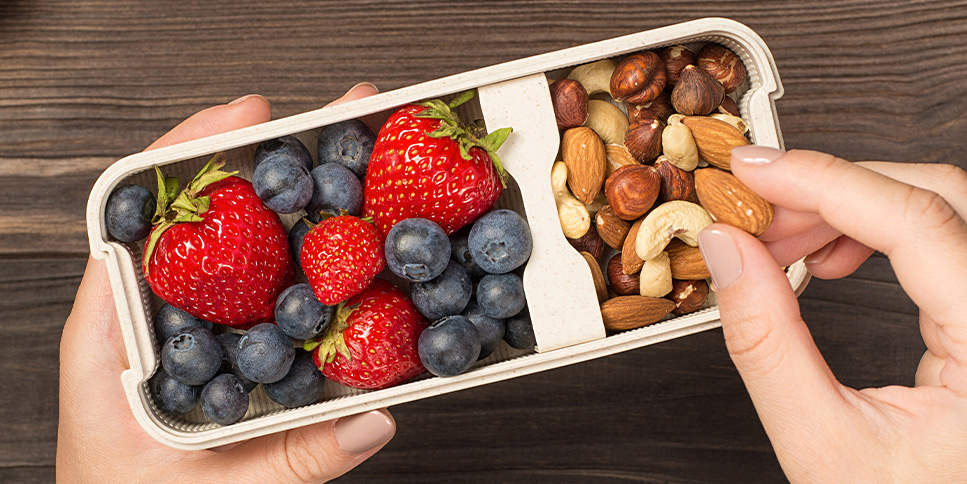It’s easy to get into a meal planning rut and purchase the same foods week after week, leading to food boredom. With a fresh New Year laid out ahead of us, it’s the perfect time to try new things, switch your routine up and turn the dial up on nutrition to be just a little healthier than last year. Progress, not perfection, is the name of the game in 2023!
Here are 10 of the most nutritious superfoods on the planet to eat more of for peak health and weight management.
1. Berries
Small but mighty, berries such as blackberries, blueberries, raspberries and strawberries are nutrient powerhouses. Not only are they lower in sugar compared to other fruits, making them an ideal go-to for those following keto and low-carb diets, they are also loaded with antioxidants, magnesium, fiber, vitamins C, K.
2. Green Tea and Matcha Powder
If you’re looking to add one superfood beverage to your life that has a superfood punch, look no further than green tea and matcha.
While green tea bags are steeped in hot water, matcha is shade-grown green tea leaves that are ground into a powder and whisked into hot water, making it the slightly more potent of the two.
Still, both green tea and matcha contain epigallocatechin gallate (EGCG).
3. Leafy Greens
One of the simplest ways to help boost your healthy weight loss diet plan, is to replace the starchy carbohydrates on your plate with leafy greens as often as possible. Not only are they are rich source of vitamins A, C, calcium, phytonutrients and fiber but they are also low calorie, high-fiber profile, which means you can eat a good sized portion without going overboard. If the idea of leafy greens sounds a little boring, try these creative recipes: Chickpea and Spinach Stew, Butternut Squash and Beet Salad.
4. Greek yogurt
Rich and creamy, filling and nutritious, Greek yogurt is the full package when it comes to superfoods. Greek yogurt is high in protein at about 10 grams per cup.
Greek yogurt is versatile and can be used in both sweet and savory applications. Try it in place of regular yogurt topped with berries, in parfaits or dolloped on pancakes and waffles instead of whipped cream or use it as a better-for-you alternative to sour cream on baked potatoes and dolloped on chilis and soups.
5. Fish
Only 10% of Americans eat enough fish on a regular basis. The USDA guideline is 8 grams a week but Harvard says 12 grams is a better amount to shoot for over, which is about two meals a week.
Not only is fish one of the best sources of animal protein but it’s also loaded with omega-3 fatty acids. Fish is a complete protein that keeps you fuller longer and it’s one of the leanest proteins you can eat.
6. Cruciferous Veggies
Just a single cup of cruciferous vegetables contains about 6 grams of fiber, which is 24% of your daily need. Cruciferous vegetables include Brussels sprouts, broccoli, cauliflower, cabbage and more—and thanks to their high fiber content, they fill you up and keep you full.
7. Chia Seeds
Chia just might be the most nutritious seed around. Chia seeds are a rich source of omega 3 and 6 and they contain a whopping 10 grams of fiber in just two tablespoons.
Chia seeds have a high-fiber content and ability to satiate for extended periods of time. Sprinkle them on parfaits and salads or use them to make chia puddings and baked goods.
8. Eggs
Eggs are one of the most versatile foods on the planet and thanks to their natural ability to keep you energized and full and their high-protein value, they make a wonderful weight-loss plan go-to.
Diet aside, they are high in choline, vitamin D, selenium, B12, riboflavin and phosphorus.
9. Avocado
Sure, avocados are calorie-dense and high in fat but it’s the good kind of unsaturated fat and will keep you full for hours.
Avocados are also a good source of folate, potassium, vitamins C and K.
10. Sweet Potatoes
Sweet potatoes are your secret weapon for those extra hungry days on your weight-loss journey. While we don’t recommend eating them daily, when you really need to satiate, a sweet potato will do the trick thanks to its slow-digestion fiber.
*The links used in this article are being provided as a convenience and for informational purposes only; they do not constitute an endorsement or an approval by Iovate Health Sciences International Inc. or any of its affiliates (“Iovate”) of any of the products, services or opinions of the corporation or organization or individual. Iovate bears no responsibility for the accuracy, legality or content of the external site or for that of subsequent links. Contact the external site for answers to questions regarding its content.






